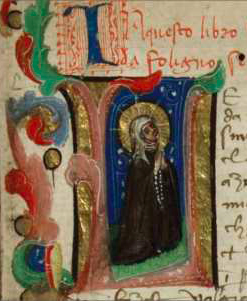
Seminar: “From Umbrian Laywoman to the ‘Teacher of Theologians’: How Angela of Foligno was made Magistra Theologorum”
Michael Hahn (Mellon Fellow, PIMS)
This project investigates the complex perception and reception of Angela of Foligno (d.1309) and her Liber. Angela was a penitent woman who aligned herself to the Franciscans in Umbria and, soon before her death, a collection of texts she had dictated was compiled in the so-called Liber Lelle. Angela’s Liber has been the subject of extensive historical, literary and theological research, in part encouraged by the 700th anniversary of Angela’s death in 2009 and her canonization in 2013. The reception of Angela and her Liber has not, however, received extensive scholarly attention, and it is this lacuna that the present research proposes to redress. By investigating a number of crucial cross-temporal and cross-confessional case studies, including within and between a variety of religious orders, the project will address the question of the ways in which Angela was perceived and received as an authoritative theological figure throughout the centuries after her death, leading to the remarkable fact that in 1624, 315 years after she died and before she had been officially beatified or canonized, she was accorded the seemingly-unique title Magistra Theologorum (“Teacher of Theologians”) by the Dutch Jesuit Maximilian Sandaeus. Case studies considered in this project are:
i) John-Jerome of Prague (c.1368–1440), Camaldolese monk and theologian;
ii) Angela’s Belgian influence, including five fifteenth-century manuscripts;
iii) Teresa of Ávila (1515–1582), Carmelite mystic, and her Jesuit spiritual director Balthazar Alvarez (1534–1580);
iv) Johann Arndt (d.1621), pastor and founder of Lutheran Pietism;
v) Maximilian Sandaues (d.1656) Dutch Jesuit and writer of a mystical lexicon.
This paper will outline the scope, originality and methodologies of this project and then focus on the case study of John-Jerome of Prague, which will be researched in this academic year at PIMS, examining: i) John-Jerome’s copying of Angela’s Liber, and ii) his treatment of medieval women mystics (Beatrice of Nazareth, Angela, Marguerite Porete and Catherine of Siena).
This seminar will be taking place in person. All COVID-19-related University protocols will be in place and adhered to. If you would like to view the Zoom livestream instead of attending in person, please contact Institute Secretary Cynthia Watson.


